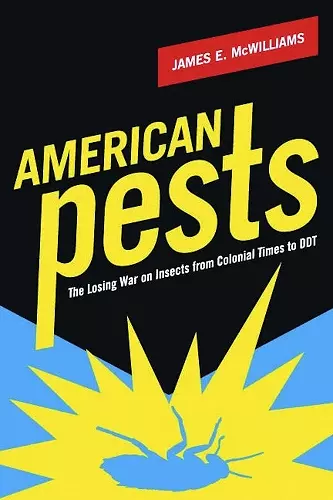American Pests
The Losing War on Insects from Colonial Times to DDT
Format:Hardback
Publisher:Columbia University Press
Published:4th Jul '08
Currently unavailable, and unfortunately no date known when it will be back

The originality of American Pests comes in the impressive sweep of its analysis and the integration of heretofore fragmented events into a coherent story. -- Jeffrey A. Lockwood, professor of natural sciences and humanities, University of Wyoming James E. McWilliams deserves high praise. He has given us the best in-depth study of the poorly conceived, terribly managed, and utterly futile war on insect pests in the United States. Sweeping in its scope, acute in its analysis, and balanced in its judgments, American Pests should precipitate a national dialogue about how we attempt to manage the insect world, whether in our farms and orchards or in our own backyards. -- James H. Jones, Alumni Distinguished Professor Emeritus, University of Arkansas at Fayetteville
Argues for a more harmonious and rational approach to our relationship with insects, one that does not harm our environment. Beginning with the early techniques of colonial farmers and ending with the modern use of chemical insecticides, this book shows how America's war on insects mirrors its continual struggle with nature and technology.The world of insects is one we only dimly understand. Yet from using arsenic, cobalt, and quicksilver to kill household infiltrators to employing the sophisticated tools of the Orkin Man, Americans have fought to eradicate the "bugs" they have learned to hate. Inspired by the still-revolutionary theories of Rachel Carson's Silent Spring, James E. McWilliams argues for a more harmonious and rational approach to our relationship with insects, one that does not harm our environment and, consequently, ourselves along the way. Beginning with the early techniques of colonial farmers and ending with the modern use of chemical insecticides, McWilliams deftly shows how America's war on insects mirrors its continual struggle with nature, economic development, technology, and federal regulation. He reveals a very American paradox: the men and women who settled and developed this country sought to control the environment and achieve certain economic goals; yet their methods of agricultural expansion undermined their efforts and linked them even closer to the inexorable realities of the insect world. As told from the perspective of the often flamboyant actors in the battle against insects, American Pests is a fascinating investigation into the attitudes, policies, and practices that continue to influence our behavior toward insects. Asking us to question, if not abandon, our reckless (and sometimes futile) attempts at insect control, McWilliams convincingly argues that insects, like people, have an inherent right to exist and that in our attempt to rid ourselves of insects, we compromise the balance of nature.
[A] colorful chronicle of pest management in the United States... As well written as it is thorough. Publishers Weekly [McWilliams] knows how to address unusual historical topics in rich detail... Poignant... Thorough... Recommended. Library Journal "[An] articulate, well-organized... excellent primer. -- Irene Wanner Seattle Times [McWilliams'] book should resonate in these times of GM temptations and global food shortages. Times Literary Supplement Highly recommended. Choice a solid contribution to U.S. environmental history, one that is refreshingly ambitious in its chronological scope. -- Sarah T. Phillips American Historical Review An engaging and important book. -- David Kinkela Technology and Culture ...a rewarding read... -- Joshua B. Buhs Journal of Southern History
- Winner of Choice Outstanding Academic Title 2008
ISBN: 9780231139427
Dimensions: unknown
Weight: unknown
312 pages